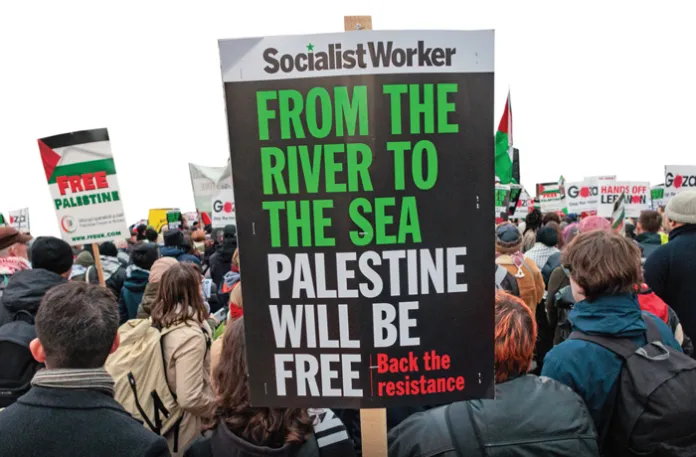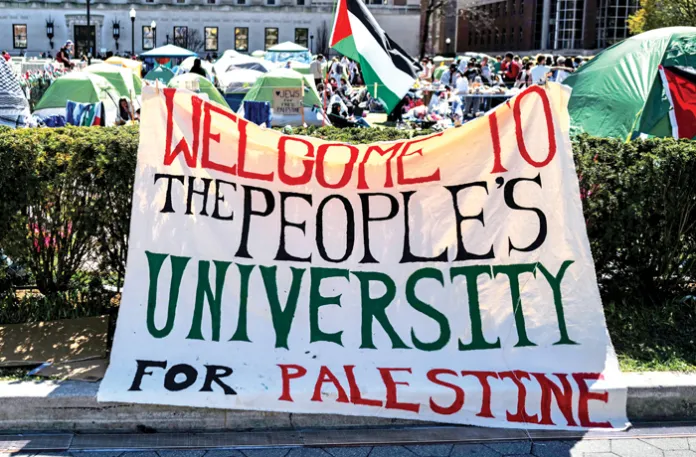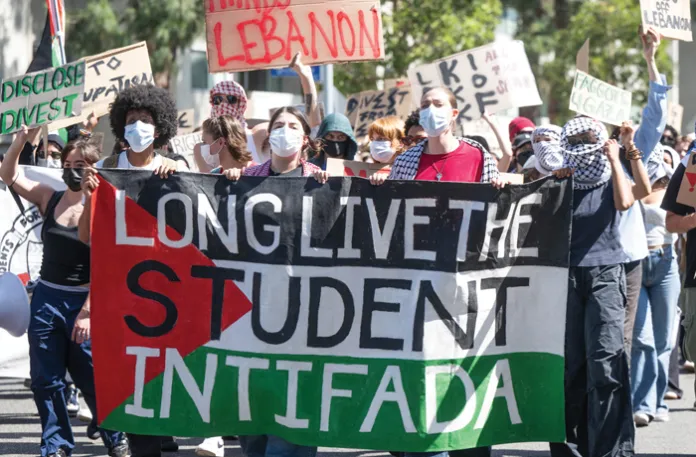Politics is a creative sport, so to pick apart a slogan or rallying cry is to risk appearing picayune, if not totally bereft of a personality. But some rhetoric is so galling in its ignorance, proud in its illogic, and emblematic of its practitioners’ moral and intellectual shortcomings as to beg for a critique.
Enter the West’s burgeoning, and increasingly ideologically diverse, anti-Israel movement.
Two years ago, war again broke out between the world’s only Jewish-majority state and its terrorist-led neighbors in the Gaza Strip. Hamas militants arrived in southern Israel to inflict maximum physical and psychological damage, murdering, raping, and kidnapping innocent Israeli men, women, and children in front of their loved ones. The scenes out of Gaza were grim, yet celebratory. Bloodied hostages and dead Israelis were paraded around before cheering throngs of civilians. To see it was to know evil.
Faux sophisticates around the world condemned these scenes, yes, but also swiftly shifted their attention not to the recovery of the hostages and pursuit of justice but to restraining the Israelis. No modern people has ever faced such opprobrium, even preemptively, merely for seeking its own survival.

The pressure has mounted in the 24 months since the start of the war. Across the world, protesters have taken to the streets, college quads, and, most bravely, the internet to protest Israel’s actions — and oftentimes its existence. Still more violence has been a natural outgrowth of this movement. In Boulder, Colorado, eight people, including a Holocaust survivor, were wounded when a man aimed a flamethrower and lobbed Molotov cocktails at a group marching in solidarity with the hostages. In Manchester, two Jews attending Yom Kippur services at a synagogue were murdered by 35-year-old Jihad al Shamie, a Syrian-born British citizen. And in Washington, D.C., two soon-to-be-engaged Israeli Embassy workers were gunned down by a man shouting, “Free Palestine!”
And perhaps that’s the place to start. At first glance, the most ubiquitous refrain of the “pro-Palestinian” movement might seem, to the uninitiated, the most innocuous. Could there be any goal more noble than to free a captive people?
But a free Palestine, or at least the one that crunchy seniors and doe-eyed freshmen march for, would be an oxymoron. Israel pulled out of the Gaza Strip completely in 2005, even going so far as to exhume the bodies of Jewish dead buried there. The following year, Hamas won the 2006 legislative elections in the strip. There haven’t been elections there since.
Hamas’s reign has been characterized by every bit as much carnage as one might expect. A 2022 report put together by the Biden State Department made note of credible reports of “unlawful or arbitrary killings” and “torture or cruel, inhuman, or degrading treatment or punishment” by Hamas personnel.

Is that all? But of course not. The enlightened “human rights advocates” in the streets have never had so much as a word to say about the “crimes involving violence and threats of violence targeting lesbian, gay, bisexual, transgender, queer, or intersex persons.” What kind of threats of violence? In 2016, the New York Times reported that Hamas had executed one of its own commanders on charges of theft and “moral turpitude,” or homosexuality.
Meanwhile, Amnesty International, no one’s idea of a friend to Israel, reported that Hamas used a 2014 skirmish between itself and Israel as a cover for “a series of abuses, such as the extrajudicial execution of at least 23 Palestinians and the arrest and torture of dozens of others, including members and supporters of Hamas’s political rivals.”
Ibrahim Dabour, an insurance company worker and father of two, was apprehended, “tried,” and executed in short order for supposedly “communicating with hostile sides.” Six more civilians were summarily executed in front of a crowd of hundreds in the same period. Others were “subjected to torture, including severe beatings with truncheons, gun butts, hoses and wire or held in stress positions.”
Videos of torture sessions recovered by Israeli authorities during the conflict in Gaza depict Hamas thugs beating Palestinian captives chained to ceilings.
And just this spring, 22-year-old Uday Rabie was arrested and tortured for participating in mass demonstrations against the terrorist group. When his tormenters called to hand him back over, they presented and beat him in only his underwear, dragging him around by a rope tied to his neck. He died shortly after being taken to the hospital by his sibling.

A Palestine “free” of the only thing Western protesters demand it be unshackled from, its proximity to Israel, would be as free — this time using the literal sense of the word — as any number of the authoritarian, Islamist states being run out of Cairo, Doha, Riyadh, Ankara, Tehran, Khartoum, Islamabad, and the other tens of thousands of miles, and hundreds of millions of people, unfortunate to live under, to paraphrase George Orwell, regimes whose modus operandi is to take their boots and stamp on as many human faces as they can find. Forever.
Free Palestine? From who?
And while some cries might be cunningly insidious, others are more brazen.
Take, as two examples, the additive declaration that Palestine must be free “from the river to the sea” and the call to “globalize the intifada!”
The river is the Jordan, and the sea is the Mediterranean. In between those two bodies of water lies the entirety of modern Israel. What, then, could it mean but to replace Israel with Palestine, the Xanadu of Western progressives’ dreams that none would dare visit should it ever come to be. As if there was ever any doubt, Khaled Mashal, the chairman of Hamas’s so-called “Political Bureau,” declared in 2012, “Palestine is ours from the river to the sea and from the south to the north.” His successor, the late Ismail Haniyeh, said the same.
The same amount of plausible deniability, or lack thereof, applies to the second chant. In Arabic, “intifada” translates to “uprising” or “shaking off.” But the historical context of the phrase is much more loaded and refers to violent clashes between the Israelis and Palestinians, first in the late ’80s and early ’90s, and then again in the early 2000s.
It’s the latter conflict, or Second Intifada, that continues to loom largest over the region to this day. In July 2000, then-President Bill Clinton hosted Palestinian Authority Chairman Yasser Arafat and Israeli Prime Minister Ehud Barak at Camp David, where Barak offered Arafat a Palestinian state composed of almost all of the West Bank and the entirety of Gaza, among numerous other concessions.
“You walk away from these once-in-a-lifetime peace opportunities, and you can’t complain 25 years later when the doors weren’t all still open, and all the possibilities weren’t still there. You can’t do it,” Clinton reflected about Arafat’s rejection of the deal last year.
If only Arafat had just walked away. A few months later, the Second Intifada — a yearslong wave of suicide bombings, shootings, and other acts of terrorism that resulted in thousands of lost lives, both Israeli and Palestinian — was underway.
“Globalize the intifada,” then, is a reminder of not just the violence Israel’s enemies relish inflicting on it but of Palestinians’ continued rejection of the peace process that their fanboys around the world blame the Israelis for standing in the way of.
Other fallbacks of the anti-Israel brigade are similarly unmeritorious. Among more mild critics, it is a force of habit to respond to any and all developments in the Holy Land by stressing the importance of pursuing a “two-state solution.”
But these faithful recitations of a failed foreign policy objective are distorting. After all, what evidence is there that a formal state of the kind that France, the United Kingdom, and Australia have recently recognized would solve any of the endemic problems in the region? Would it satisfy those demanding a Palestine that stretches from river to sea? Would it root out the Jew hatred impressed in the hearts of Palestinians from a young age? Would it grant those living under Hamas or PA rule a government that respects their own dignity?
Another common complaint, this one promulgated by more sinister right- and left-wing Israel obsessives, is that the world’s only Jewish state wields a disproportionate amount of influence over the American government.
But that narrative is a false one. Between 2016 and 2024, Israel was, despite popular perception, only the 10th biggest foreign spender on lobbying in the United States, according to watchdog OpenSecrets. Three of those in front of it — Qatar, Saudi Arabia, and the United Arab Emirates — are Islamist nations with long histories of opposing Israeli interests and funding global jihadism.
DEMOCRATS IMITATE TRUMP WITHOUT UNDERSTANDING HIS APPEAL
The success of Israel’s efforts to sway American leaders could always be chalked up to the fact that as the Middle East’s only liberal democracy, and its preeminent economic and military powerhouse, it is the U.S.’s most natural ally. But such an answer continues to elude those determined to find one that plays into thousand-year-old stereotypes about Jewish money and its uniquely corrosive power.
Rhetoric is most often regarded as a tool, but it’s also a reflection of its users’ character. The West’s so-called “pro-Palestine” movement relies in equal measure on meaningless platitudes, ghastly terrorist slogans, outdated talking points, and overtly antisemitic canards. And that’s how you can be assured that it is composed, by and large, of a toxic union of mediocrities, radicals, conformists, and yes, antisemites.
Isaac Schorr is an editor at Mediaite.
